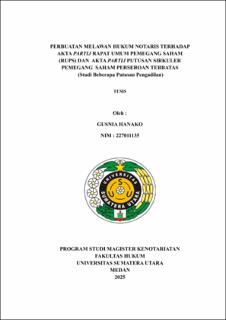Perbuatan Melawan Hukum Notaris Terhadap Akta Partij Rapat Umum Pemegang Saham (RUPS) dan Akta Partij Putusan Sirkuler Pemegang Saham Perseroan Terbatas (Studi Beberapa Putusan Pengadilan)
Unlawful Acts by Notaries in the Drafting of Shareholders' General Meeting Deeds and Circular Resolution Deeds (A Study of Several Court Decisions)

Date
2025Author
Hanako, Gusnia
Advisor(s)
Purba, Hasim
Siregar, Mahmul
Metadata
Show full item recordAbstract
The development of notarial deeds continues to evolve alongside the increasing diversity of deed types that can be drafted by notaries. Among them are circular resolution deeds (akta partij putusan sirkuler) and general meeting of shareholders deeds (akta partij RUPS). In practice, the preparation of these deeds often faces issues such as the failure to accurately reflect the parties' intentions in the deed, as well as notaries exhibiting a lack of neutrality. These circumstances result in deeds that are deemed invalid and in violation of the notarial code of ethics. This study discusses the notary's duties in carrying out their functions, particularly in the preparation of circular resolution deeds and shareholders' general meeting deeds, the legal implications of unlawful acts committed by notaries, and their legal liability in the event of such violations.
This research adopts a normative legal research method with a descriptive-analytical approach. The data used consist of primary, secondary, and tertiary legal sources, collected through literature review and document study. The data analysis is qualitative, involving the interpretation, evaluation, and formulation of conclusions expressed in descriptive narrative.
The findings conclude that in Decisions Number 46/PDT.G/2023/PN CBI and 236/Pdt.G/2019/PN.Bdg jo Decision Number 484/PDT/2020/PT.BDG jo Decision Number 2826 K/Pdt/2021, and Decision Number 141/Pdt.G/2018/PN Blb jo Decision Number 454/PDT/2019/PT BDG jo Decision Number 511 K/Pdt/2021, notaries were found to have committed unlawful acts under Article 1365 of the Indonesian Civil Code (KUHPer), particularly in relation to the drafting of circular resolutions and general meeting deeds in violation of the Notary Office Act. In the first group of decisions, the judges' rulings were deemed appropriate due to clear evidence of notarial misconduct. However, in the latter case, the researcher finds the ruling less appropriate, as the notary had fulfilled their authority in accordance with prevailing regulations and merely recorded the parties' intentions, thus should not be held liable.
Collections
- Master Theses (Notary) [2307]
